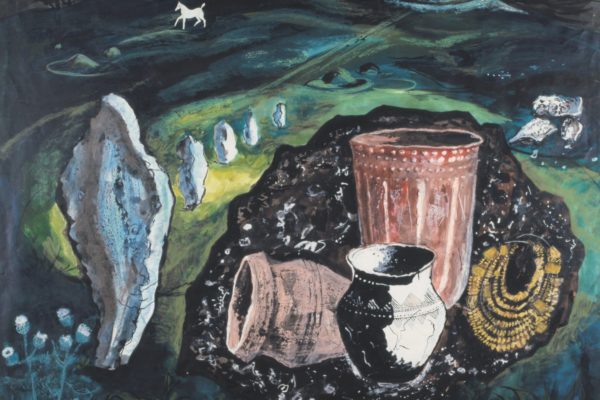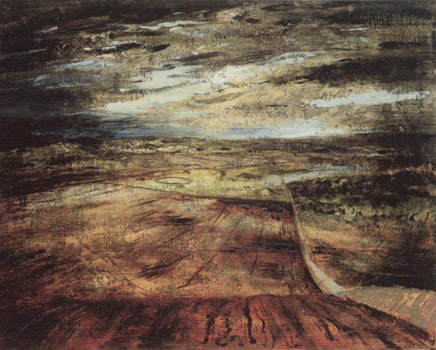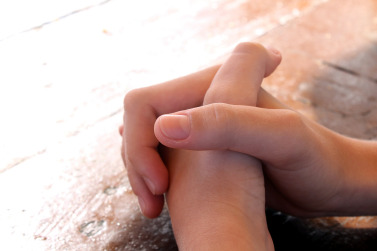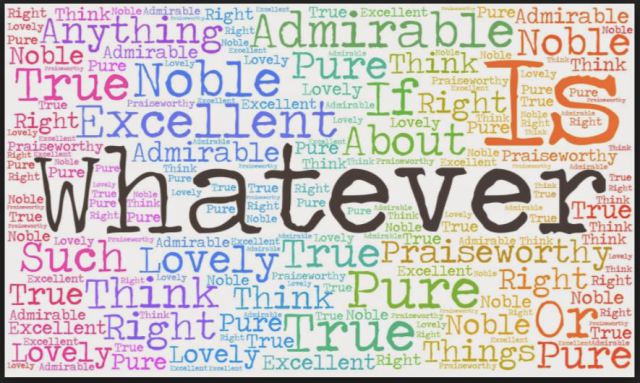
John Piper, ‘Wiltshire archaeology’
Albion– an old word for an old place. But I feel we need to use it in a new way, to express an old emotion free of some of the associations that have attached themselves to other names.
Love for your home country is an inborn sensation, just as a sense of national identity seems to be. But what is that identity formed from? We are all just stories we tell to ourselves and nationality is just one element in those stories. It’s woven from many things: from memories of home, of holidays, of history lessons at school and from books we have read; it crystallises out of pictures we have seen and views enjoyed from trains and cars. It is the product of a set of accidents and is shaped as much by choice as by circumstance. With Yorkshire roots but with antecedents also from Sunderland, Manchester, Cornwall, Ireland and Germany, what are my origins, what are my roots? Does ‘home’ change with time, so that a couple of decades resident in London now make me more attached to the capital and to Essex than to my birthplace? Is belonging just a matter of imagination and volition?

John Piper, ‘Cartoon for the stained glass window at Wiltshire museum.’
And yet, there is no denying a sense of attachment to certain places and certain landscapes, and to the ideas and that they evoke- to my own particular formulation and conception of ‘national pride.’ I might have said Englishness, which would have been accurate enough, except whilst chalk figures, downland, hill-forts, fields and pastures, woods and castles are all configurations of natural and built environment that can be uniquely English, I hesitate about the labels:
- English describes a country from the south coast to the Border at Hadrian’s Wall, but it carries with it other meanings- wars with France, invasions of neighbouring lands, drunken football fans on the rampage, a particular ethnic pride waving the St George flag;
- British evokes an island and the rich diversities of landscape and culture from Cornwall to Caithness, but there are too memories of the British Empire and those other connotations of ‘Great’ Britain, outdated but persistent as they are; and,
- United Kingdom is a purely political identity; I may more readily say that I am English or British but few can identify with the UK as a real place, not least now that it faces dissolution though devolution and since UKIP gave it a particular separatist and isolationist meaning and further narrowed and politicised it.

John Piper, ‘Salisbury plain.’
Which brings us to Albion, a name unfreighted with the burdens of the past. It’s a name from literature and history that more readily suggests the unique combination of land and culture, of geography and history, of art and imagination, memory and inspiration that inspires and motivates me. Albion has emotional meaning- and not just for me: witness Peter Ackroyd’s 2002 cultural history entitled Albion. He quotes Ford Madox Ford (The spirit of the people, 1912) to the effect that “It is not- the whole of Anglo-Saxondom- a matter of race, but one quite simply of place- of place and of spirit, the spirit of being born of the environment.” Ackroyd also shares with John Cowper Powys a sense that “the spirit of the earth called out to him from the green shoots beneath his feet so that he was filled with the genius loci and sustained by it.” In his earlier novel First light he described in the Dorset landscape an “almost human presence,” as if the foregoing generations had left an echo. With Wordsworth (Prelude, Book 2, School tree) Ackroyd hears “the ghostly language of the ancient earth,” and himself concludes (p.448) that his subject is “the landscape and the dreamscape. It encourages a sense of longing and belonging. It is Albion.”
Perhaps the time is right to rediscover and reestablish Albion. For fuller details of my fiction and nonfiction writings on British folklore, see my website.

John Piper, ‘Avebury restored’
Advertisements Share this:





